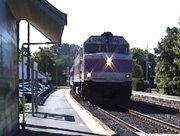Modernity in Walden
3. “Modernity” Sounds of Walden
Thoreau’s cabin was nestled among the woods less than one quarter mile away from the Fitchburg Railroad stop. The train crossed near the southern tip of the pond, and its morning arrival was often cloaked by its own billowing clouds of smoke and the woods that stood between society and Thoreau: “I watch the passage of the morning cars with the same feeling that I do the rising of the sun, which is hardly more regular” (Thoreau, 1854, “Sounds”).
Thoreau was influenced by the philosophical convergence of spiritually and materiality, which for him began with his Unitarian upbringing and prospered through time spent with mentor Ralph Waldo Emerson. Thoreau’s Walden was a spiritual journey through sound and silence and his means toward greater introspection (Lambdin, 1969; Sherman, 1950). The aural passage of Thoreau’s “train” travels between an inner and outer sanctuary called Walden, a proximity juxtaposed by the sounds of modernity and nature with a revelatory translation into a Divine language, which he exclaims with words of praise, fear, and wonder through his writings. The railroad (in all its word forms) is mentioned 55 times by Thoreau in Walden, and the majority of these references are found in the first three chapters. The train whistle glides through the acoustical realm on one occasion; another time it is a crude iron beast that dominates the soundscape.
Perhaps it is the change in atmospheric pressure that accentuates the whistle for Thoreau, for that is a common meteorological phenomenon. Or perhaps, it is Thoreau’s perspective that evolves and devolves as he contemplates meaning from his observations. So it is not surprising that sound has the potential to promote both assimilation and alienation to a listener in a moment. The tumultuous expansion of the railways around Europe and the
For two years, Thoreau lived near
When I meet the engine with its train of cars moving off with planetary motion- or, rather, like a comet, for the beholder knows not if with that velocity and with that direction it will ever revisit this system, since its orbit does not look like a returning curve - with its steam cloud like a banner streaming behind in golden and silver wreaths, like many a downy cloud which I have seen, high in the heavens, unfolding its masses to the light - as if this traveling demigod, this cloud- compeller, would ere long take the sunset sky for the livery of his train; when I hear the iron horse make the bills echo with his snort like thunder, shaking the earth with his feet, and breathing fire and smoke from his nostrils… (Thoreau, 1856, “Sounds”)
It is interesting that Thoreau’s discussion of the
Experience the Train - photo (above) and sounds from:
http://www.cyberbee.com/henryhikes/movies/fitchburg.mov
Next in series - "Crossing the Boundaries of Noise...."
Online resources are available regarding the works of Thoreau, Fuller, and a host of new environmental artists and researchers through
"The Walden Woods Project" (founded in 1990 by Don Henley).
*********************************************************************



<< Home